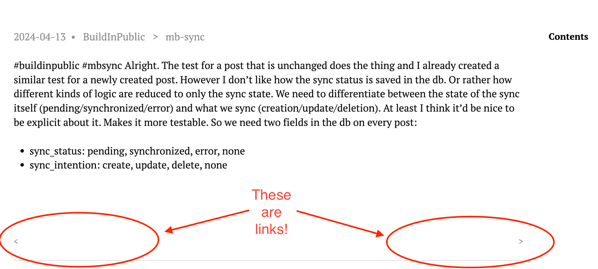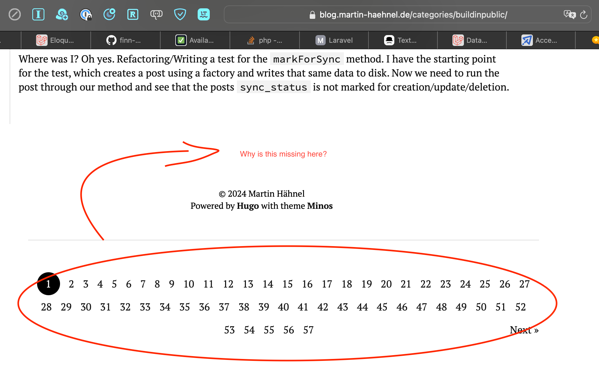At the moment I’m working on implementing the minimalistic sync engine - even calling it that gives it too much credit. One test is failing, it seems that the sync status is not marked as pending when we mark a post for sync. #buildinpublic #mbsync
I’ll continue my work on mb-sync. It’s always a little hard to know how much time I have - so I might need to do something else soon, but I’ll at least start. #buildinpublic #mbsync
DailyDogo 879 🐶

DailyDogo 878 🐶

The metrics that people in charge at my work care about the most seem(!; to me) to be not reached. It’s true, I can be kind of slow but what I do is mostly thought through. It just takes time. Sometimes too much, I guess.
Amazing, how quickly confidence wanes under pressure. Tomorrow’s another day.
Wanting to do a good job and wanting to do a quality job aren’t always congruent.
DailyDogo 877 🐶

DailyDogo 876 🐶

Okay fixed the theme next/previous links: {{ $cleanContentNext := .NextPage.Content | plainify }} {{ if gt (len $cleanContentNext) 20 }} {{ printf "%.20s" $cleanContentNext }} {{ else }} {{ $cleanContentNext }} {{ end }} {{ end }} And the other problem seems to have been a category filter not having run through. There is no pagination, it just shows all the posts on one page. Which is fine for now.
My theme switch has lead to a couple of problems that I have to solve it seems in time I don’t have. 1. posts without a title lead to links without one in the single post view  2. for some reason the categories view is not paged and you can’t view posts in a category past the 11th post. Why?
2. for some reason the categories view is not paged and you can’t view posts in a category past the 11th post. Why?  Great. Great stuff.
Great. Great stuff.
DailyDogo 875 🐶

#buildinpublic #zknstuff The library is closing soon and I’m spent mentally for the moment. Time to take the rest of the Sunday off!
#buildinpublic #zknstuff I did it. Around 200 notes have been reviewed, filed away, linked to and from, some of them tagged, renamed, deleted (very few). Most of them were how-to notes, some were ideas, some were project journals, some just held some information like an address, a measurement, etc.
#buildinpublic #zknstuff Still 66 files to go. An observation: I need to do focussed reviews, that is, reviews that only tackle part of the system, more often. That I can review files in this way is actually very helpful to make those notes I took time to write more useful and discoverable.
#buildinpublic #zknstuff Still 136 Files to review in my Inbox and I might not do anything else after this, actually, since this is going to take a moment still. But I’m very happy that the simple note review plugin works now as expected.
#buildinpublic #zknstuff I think that either simple note review or the underlying dataview plugin got a fix, because it now actually works as expected?! I’m reviewing, moving and lightly editing the notes in my Inbox folder and try to think a little how to review my readwise highlights next.
#buildinpublic #zknstuff Even though I had abandoned the simple note review plugin since it didn’t work very well and the spaced repetition plugin seemed more stable I have now reverted to the former. Main reason: Having different review queues, since having just one giant queue didn’t cut it.
#buildinpublic #zknstuff I’m trying to figure out how to use these library Sundays the best at the moment and my idea was to use the spaced repetition plugin for it. I have done that a handful of weeks now but with so many notes it is kind of unsatisfying. So let’s think about the review process a little, cleaning up what is there and maybe finding a new way to do things.
Today I’m spending time in the library working on my notes. I thought I’d try to do a #buildinpublic kind of thing, since it was fun the last couple of days to post about what I’m doing as regards to #mbsync. so I’m going to try this here, too. Hashtags will be #buildinpublic and #zknstuff.
#buildinpublic #mbsync That’s it for today. Lots of little things done. Learned some stuff and realized a lot of things about how to structure the sync state. This’ll be the most important part of the app, so it’s alright if it takes some time and some attempts to get right.
#buildinpublic #mbsync Alright. The test for a post that is unchanged does the thing and I already created a similar test for a newly created post. However I don’t like how the sync status is saved in the db. Or rather how different kinds of logic are reduced to only the sync state. We need to differentiate between the state of the sync itself (pending/synchronized/error) and what we sync (creation/update/deletion). At least I think it’d be nice to be explicit about it. Makes it more testable. So we need two fields in the db on every post:
- sync_status: pending, synchronized, error, none
- sync_intention: create, update, delete, none
#buildinpublic #mbsync So. Me the last few hours:
I’m not distracted, I’m on a side quest. — https://beige.party/@RickiTarr/112264314660393539
Where was I? Oh yes. Refactoring/Writing a test for the markForSync method. I have the starting point for the test, which creates a post using a factory and writes that same data to disk. Now we need to run the post through our method and see that the posts sync_status is not marked for creation/update/deletion.
DailyDogo 874 🐶

#buildinpublic #mbsync Ugh. And even more problems. I use the laravel validated dto package, because I like working with DTOs and getting validation “for free” is nice. However:
If a post doesn’t have a category the mb api returns an empty array. Fine. I can validate this as 'categories' => ['present', 'array'],, but interestingly the DTOs saves this internally as null. And guess what? categories in not nullable anymore when I try to save a post with empty categories to the db. Hmpf.
#buildinpublic #mbsync Discoverd another problem: I was allowing the categories field (json in the db) in my Post model to be null. Turns out if you do that you can’t cast that json to array through eloquent. So I changed that in my migrations, but this means that the assumption you can write a post to the db with categories being null doesn’t hold anymore. So more yak shaving…